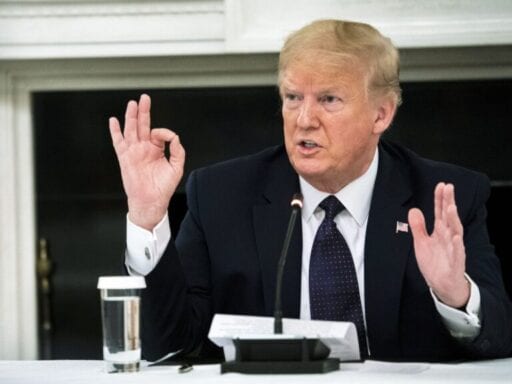Experts say it’s a foolish idea.
President Donald Trump has taken a step toward following through on his weeks-long threat to permanently cut funding to the World Health Organization unless it implements reforms that weaken China’s influence.
On Monday, Trump sent a letter to WHO Director General Dr. Tedros Adhanom Ghebreyesus outlining the US’s grievances about the WHO’s handling of the coronavirus pandemic and warning, “If the WHO does not commit to major substantive improvements within the next 30 days, I will make my temporary freeze of United States funding to the WHO permanent and reconsider our membership.”
Trump accused the organization of “repeated missteps,” including not pushing China to allow international inspectors into the country as the coronavirus outbreak grew; falsely asserting in January that “Chinese authorities have found no clear evidence of human-to-human transmission” of Covid-19; and early on failing to declare the coronavirus a pandemic due to pressure from Chinese authorities.
This is the letter sent to Dr. Tedros of the World Health Organization. It is self-explanatory! pic.twitter.com/pF2kzPUpDv
— Donald J. Trump (@realDonaldTrump) May 19, 2020
Trump argues that these and other perceived transgressions are evidence that the global body is too cozy with Beijing. The “only way forward for the [WHO] is if it can actually demonstrate independence from China,” Trump wrote in the letter, adding that the US and the WHO are in talks about how to do just that.
When asked what specific changes the administration wants to see the WHO take, the State Department referred me to the White House. The White House didn’t return a request for comment.
According to the letter, the WHO has 30 days to reform in a way Trump approves of or it risks losing nearly $900 million in US contributions every two years, by far the most the body receives from any nation. Trump had already frozen about $400 million of that money last month while his administration reviewed its WHO pledges.
While it’s true the WHO made some egregious mistakes, it’s also clear that the Trump administration failed to seriously plan for a possible outbreak in the US once it knew of the disease. On January 3, for example, Chinese health authorities told the US Centers for Disease Control and Prevention and the WHO about a pneumonia outbreak in Wuhan.
Trump’s “letter seems to indicate that had the WHO conveyed the right information, the US would have acted differently in responding to the outbreak,” said Yanzhong Huang, a global health expert at the Council on Foreign Relations. But “the president has seldom paid heed to any WHO advice.”
“Whatever the WHO knew, the US knew,” he added.
Some believe Trump’s ire toward the WHO is merely an effort to deflect blame for his administration’s poor coronavirus response. Even if it is, it’s not certain Trump’s gambit will actually pay off. In fact, it might backfire on him — and the world.
The major problems with Trump’s WHO threat
Experts I spoke to cited three main reasons why the idea of completely defunding the WHO is a bad idea.
First, China gave less than 10 percent of the money America did to the WHO last year. If any leader was in a position to push the global body to reform before the coronavirus hit, it was Trump.
The administration “seems not to understand that condemning WHO malfeasance, some of which is no doubt real, also indicts the US for neglecting its influence at the organization,” said David Bosco, an expert on international organizations at Indiana University. “How did it not use that massive leverage in a more timely way?”
Kelley Lee, the research chair in global health governance at Simon Fraser University in British Columbia, told Vox’s Jen Kirby last month that one way the WHO could reform is countries give up a little of their sovereignty in terms of a global health response and give the institution more authority. That would help take politics out of the equation and make the next pandemic strategy a more technocratic one.
Further, Washington’s withdrawal from the WHO would leave a massive financial vacuum that Beijing would surely be happy to fill. “If the promised cuts were enacted, China would become even more prominent as a WHO funder and its influence would grow,” Bosco told me.
That’s already happening: During a Monday meeting of the WHO’s decision-making body, Chinese President Xi Jinping promised $2 billion over two years to boost the world’s coronavirus response, on top of the millions in WHO funding China had previously pledged.
And there’s a bigger concern outside of just US-China relations: A weakened WHO will struggle to combat not just Covid-19 but also future pandemics. With over 150 field offices worldwide, the body’s staff helps track new illnesses and coordinate the global response for it. It doesn’t actually send people to treat the sick directly. Instead, it basically serves as the world’s disease intelligence aggregator and assists countries with their own strategies.
With less money coming in from the US, though, it’s likely the WHO will struggle to fund those intelligence-gathering and assistance processes, meaning the world would be more blind to the next pandemic and less capable to defeat it. That, in turn, would surely make everyone on Earth less safe — and perhaps even require the US to spend more money down the line.
In this case, then, Trump may have identified the issue — the WHO fumbled its initial coronavirus response partly because of China — but missed the treatment.
Author: Alex Ward
Read More



